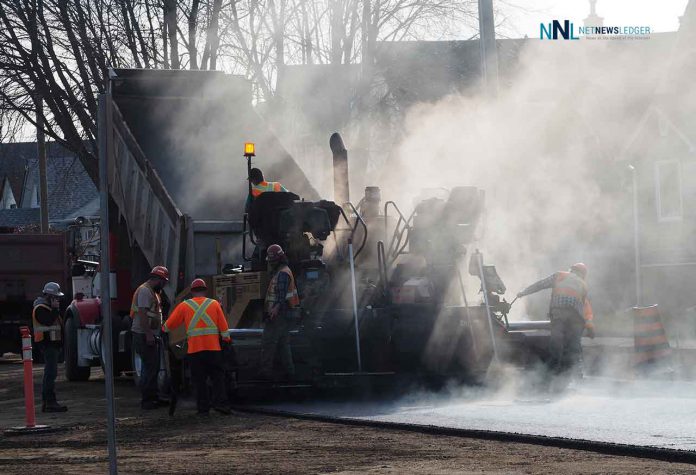Asphalt is a popular material for paving roads, driveways, and parking lots in the United States and Canada. In fact, over 94 percent of the 2.6 million miles of paved roads in the U.S. are surfaced with asphalt. There are several reasons why asphalt is so popular in these countries, including its durability, cost-effectiveness, and environmental benefits.
Durable
One of the main reasons why asphalt is popular is because it is durable and long-lasting. Asphalt is made from a mixture of aggregate (crushed rock or gravel) and bitumen, a sticky, black, semi-solid form of petroleum. When these materials are combined and compacted, they form a strong, stable surface that can withstand heavy loads and withstand wear and tear over time. Most asphalt types offer almost 90% of their original structural integrity level after ten years, making asphalt a cost-effective choice for paving roads, driveways, and parking lots.
Due to this, one of the main advantages of asphalt is its ability to withstand extreme weather conditions. Asphalt can withstand freezing temperatures and is resistant to cracking and potholes, making it a good choice for paving roads and other surfaces in cold climates. Asphalt is also able to withstand high temperatures and is resistant to fading and cracking due to the sun’s UV rays, making it a good choice for paving roads and other surfaces in hot climates.
Cost-Effective
In addition to its durability, asphalt is also popular because it is cost-effective. Asphalt is typically less expensive to install and maintain than other paving materials such as concrete. It can also be repaired more easily and at a lower cost than concrete, which requires more extensive and costly repairs. Asphalt can also be recycled and reused, which helps to reduce waste and lower the overall cost of paving projects.
Environmentally Friendly
Another reason why asphalt is popular is that it is environmentally friendly. Asphalt production and paving processes have become more efficient and sustainable in recent years, making it a more eco-friendly choice for paving roads and other surfaces. Asphalt production generates fewer greenhouse gas emissions than other paving materials, and asphalt paving projects often result in less impact on the environment compared to projects that involve concrete or other materials. Asphalt can also be recycled and reused, which helps to reduce waste and lower the overall carbon footprint of paving projects.
Noise Reductive
Asphalt is also popular because it is quiet and can help to reduce noise levels on roads. Highways paved in asphalt can lower noise levels by 3-5 decibels, compared to highways that have noise walls. This is because asphalt absorbs sound waves, making it a good technology choice for roads located near residential areas or other areas where noise levels need to be minimized.
Aesthetic
In addition to its practical benefits, asphalt also has aesthetic appeal. Asphalt can be made in a variety of colors and can be finished with a smooth or textured surface, making it a versatile choice for paving projects. Asphalt paving can also be stamped or stenciled to create patterns or designs, giving it a decorative element that can enhance the appearance of any project.
Easy Maintenance
Asphalt is also easy to maintain and can be sealed to extend its lifespan. Asphalt seal coating is a process that involves applying a protective coating to the surface of the asphalt. This coating helps to protect the asphalt from the elements and prevents it from drying out and cracking. Sealing asphalt can also help to enhance its appearance and make it look new again.
Overall, asphalt is a popular choice for paving roads, driveways, and parking lots in the United States and Canada due to its durability, cost-effectiveness, and environmental benefits. Its ability to withstand heavy loads, ease of repair, and ability to be recycled and reused make it a cost-effective choice for paving projects. Its environmental benefits and noise-reducing properties also make it a popular choice for paving roads and other surfaces in these countries.







